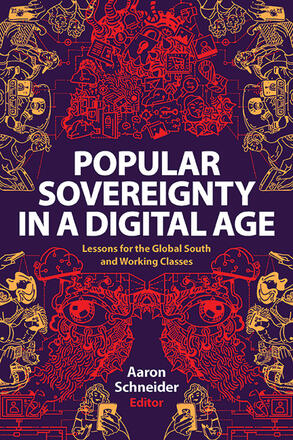
Popular Sovereignty in a Digital Age
Lessons for the Global South and Working Classes
Looks at how digitalization has changed the way we produce and interact, and the implications for working classes and countries of the Global South.
Description
In the evolution of global capitalism and geopolitics, digitalization presents a new and yet unresolved chapter. In the lead up to digitalization, neoliberalism weakened the welfare states of the global North and the developmental states of the global South where they existed. Neoliberalism also disorganized working classes, as Left parties and labor organization declined across the globe. Into this deregulated and unchecked context, digitalization proceeded, and technology companies inserted themselves into multiple sectors, making use of first mover advantage and monopolistic practices to drive out smaller and less advanced firms. We can now characterize a landscape in which states have been weakened, working classes disorganized, and rival firms greatly handicapped, allowing big tech to operate as all-powerful quasi-monopolies. They enjoy unprecedented concentration of wealth, power, and advantage. Worryingly, deregulated technology now penetrates many areas of life with surveillance and control, setting us on a path towards anti-democratic, neo-imperial, and exclusionary futures. Aaron Schneider offers a popular and sovereign alternative, with particular focus on labor and the global South.
Aaron Schneider is Leo Block Chair, Professor of International Studies at the University of Denver. He is the author of China, Latin America, and the Global Economy: Economic, Historical, and National Issues; Renew Orleans? Globalized Development and Worker Resistance after Hurricane Katrina; and State-Building and Tax Regimes in Central America, among other books.
Reviews
"Popular Sovereignty in a Digital Age starts from the realization that the world is undergoing a profound change. Digital information technologies are restructuring society and the state itself, requiring new efforts to build public policies that tackle inequalities. This book covers key issues for our future in the digital age, such as work and income, the environment, democracy, and representativeness, social assistance, and public policies, among others. Especially at a time when fascism is on the rise, it is essential to look ahead, to see what challenges and opportunities the twenty-first century presents, continue to do more and better, learning from the past and always attentive to change." — Luiz Inácio "Lula" da Silva, President of Brazil
"Drawing from a diverse group of scholars from marginalized groups, Popular Sovereignty in a Digital Age approaches the issue of digital sovereignty in emerging or non-western countries, especially Brazil, China, and India, from a variety of perspectives. Scholars and students at the intersection of political economy (critical, Marxist studies) and digital studies (Internet and Society, social media studies, digital sociology) will find these essays particularly valuable." — Roderick Graham, author of The Digital Practices of African Americans
"In this thought-provoking book, the authors delve into the intricate landscape of the current global transition, often dubbed the 'fourth industrial revolution.' They skillfully navigate historical shifts over the past century, emphasizing the pivotal role of these transitions in sparking national and international crises. As digital technology reshapes the essence of capitalism, the authors argue for an alternative future grounded in popular sovereignty. Urging action, they emphasize the importance of organized popular sectors, particularly in the global South, to shape the terms of the digital era. The book provocatively explores the challenges and opportunities posed by digitization, advocating for a deeply democratic, socially inclusive, and ecologically sustainable path forward." — David Nemer, author of Technology of the Oppressed